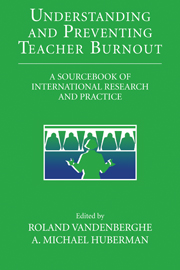Book contents
- Frontmatter
- Contents
- Contributors
- List of Figures
- List of Tables
- Foreword
- Introduction: Burnout and the Teaching Profession
- PART ONE TEACHER BURNOUT: A CRITICAL REVIEW AND SYNTHESIS
- PART TWO TEACHER BURNOUT: PERSPECTIVES AND REMEDIES
- 7 Inconsequentiality – The Key to Understanding Teacher Burnout
- 8 Turning Our Schools into a Healthier Workplace: Bridging Between Professional Self-Efficacy and Professional Demands
- 9 Teaching Career: Between Burnout and Fading Away? Reflections from a Narrative and Biographical Perspective
- 10 A Psychosocial Interpretation of Teacher Stress and Burnout
- 11 Burnout Among Teachers as a Crisis in Psychological Contracts
- 12 Progress in Understanding Teacher Burnout
- 13 Teachers' Moral Purpose: Stress, Vulnerability, and Strength
- 14 Teacher Burnout from a Social-Cognitive Perspective: A Theoretical Position Paper
- 15 Professional Identity, School Reform, and Burnout: Some Reflections on Teacher Burnout
- 16 Conflicting Mindscapes and the Inevitability of Stress in Teaching
- 17 Do Teachers Burn Out More Easily? A Comparison of Teachers with Other Social Professions on Work Stress and Burnout Symptoms
- 18 Teacher Burnout
- PART THREE TEACHER BURNOUT: A RESEARCH AND INTERVENTION AGENDA
- References
- Index
14 - Teacher Burnout from a Social-Cognitive Perspective: A Theoretical Position Paper
Published online by Cambridge University Press: 06 January 2010
- Frontmatter
- Contents
- Contributors
- List of Figures
- List of Tables
- Foreword
- Introduction: Burnout and the Teaching Profession
- PART ONE TEACHER BURNOUT: A CRITICAL REVIEW AND SYNTHESIS
- PART TWO TEACHER BURNOUT: PERSPECTIVES AND REMEDIES
- 7 Inconsequentiality – The Key to Understanding Teacher Burnout
- 8 Turning Our Schools into a Healthier Workplace: Bridging Between Professional Self-Efficacy and Professional Demands
- 9 Teaching Career: Between Burnout and Fading Away? Reflections from a Narrative and Biographical Perspective
- 10 A Psychosocial Interpretation of Teacher Stress and Burnout
- 11 Burnout Among Teachers as a Crisis in Psychological Contracts
- 12 Progress in Understanding Teacher Burnout
- 13 Teachers' Moral Purpose: Stress, Vulnerability, and Strength
- 14 Teacher Burnout from a Social-Cognitive Perspective: A Theoretical Position Paper
- 15 Professional Identity, School Reform, and Burnout: Some Reflections on Teacher Burnout
- 16 Conflicting Mindscapes and the Inevitability of Stress in Teaching
- 17 Do Teachers Burn Out More Easily? A Comparison of Teachers with Other Social Professions on Work Stress and Burnout Symptoms
- 18 Teacher Burnout
- PART THREE TEACHER BURNOUT: A RESEARCH AND INTERVENTION AGENDA
- References
- Index
Summary
The chapters in this volume by Miller, Smylie, and Woods reflect a sociological approach to understanding the burnout phenomenon. This view implies that the objective situation has changed for the worse for teachers who increasingly experience constraints on the job – for example, intensification of teaching, compliance with administrative regulations, conflicts with parents and supervisors, and unmotivated students. To balance this sociological view, we have decided to compose a psychological position paper that focuses on the responses of the individual teacher to this situation. Thus, we have chosen the opposite extreme to shed some light on the issue. This does not necessarily mean that the blame is put on the teacher when he or she suffers from burnout. Rather, our theory tries to explain why there are individual differences and why not all teachers become victims of a school-system-induced burnout syndrome.
There is ample evidence that teachers, in the course of their careers, experience a great deal of stress that may result in depressed mood, exhaustion, poor performance, and attitude and personality changes, which, in turn, may lead to illness and premature retirement. In some societies or school systems, this might occur nowadays more often than in the past (see chapters by Miller, Smylie, and Woods, this volume).
The label “burnout” has been suggested for this phenomenon, and clinical observations have been made and empirical research has been conducted for more than two decades (for an overview, see Byrne, this volume).
- Type
- Chapter
- Information
- Understanding and Preventing Teacher BurnoutA Sourcebook of International Research and Practice, pp. 238 - 246Publisher: Cambridge University PressPrint publication year: 1999
- 29
- Cited by



